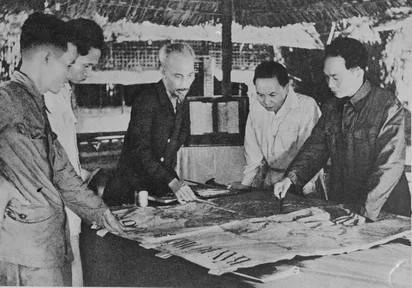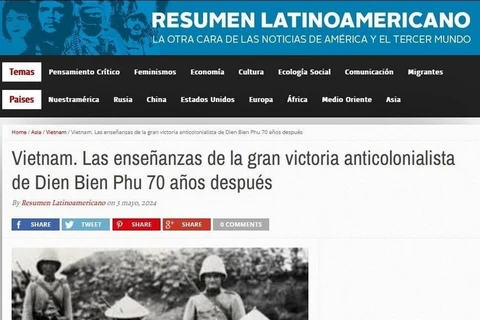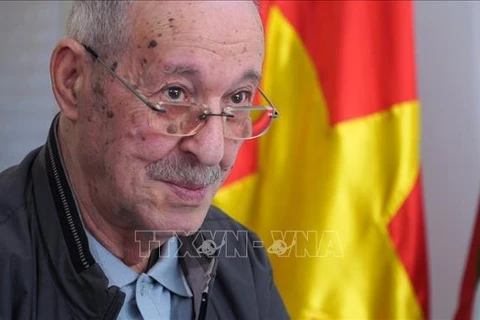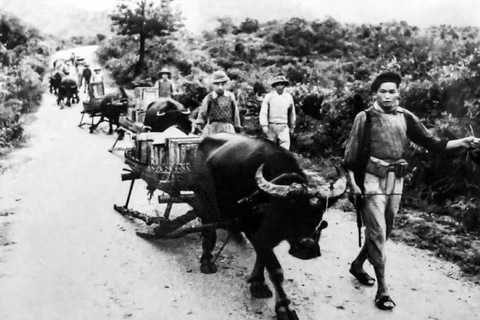
London (VNA) – The Dien Bien Phu Victory (May 7, 1954) was a ground breaking victory, not just for the Vietnamese people who fought for independence, freedom and socialism, but also for liberation movements in Southeast Asia and the world at large, said Kyril Whittaker, a British researcher of Vietnamese politics and history.
In an interview granted to the Vietnam News Agency (VNA) in the UK, he said the Vietnamese revolution, including the Dien Bien Phu Victory, had a profound effect around the world, as it showed the strength of the people against colonialism and imperialism, and for peace and independence.
The researcher also analysed the factors behind the victory that are the sound leadership by the Communist Party of Vietnam (CPV) which took the people as the root and correctly assessed the historical and material conditions of the time, the leadership by President Ho Chi Minh and General Vo Nguyen Giap, the role of the Vietnam People’s Army, and proletarian internationalism.
Whittaker elaborated that the Party, guided by Marxism-Leninism, “had a correct view of the revolutionary movement, made careful plans, and took the people as the root.”
He cited President Ho Chi Minh as saying: “Even if something is quite easy, without the people it cannot be done. Even if something is extremely difficult, with the people’s support it can be done.”
“With its correct analysis of the contradictions of the time both nationally and internationally as well as a thorough understanding of the revolutionary movement in the country, the CPV could lay the foundations not just for the victory of the Vietnamese people over colonialism and imperialism, but also for socialism building,” the researcher stressed.
He went on to say that in the past, many revolutionaries of different ideologies tried to rise up and drive away colonialism, yet the movement, one after another, failed to eradicate the yoke of colonialism and to mobilise the people.
“It was only the CPV with Marxism-Leninism at its core, under the leadership of President Ho Chi Minh, that could do this, because it could correctly assess the role of the working class and peasantry, and internal contradictions, and could show the people a clear path to a brighter future,” said Whittaker.
For the role of President Ho Chi Minh and General Vo Nguyen Giap in the Dien Bien Phu Campaign and other victories of the Vietnamese revolution, he said the two contributed greatly to not just the Vietnamese revolution but also the ideas of subsequent communist and national liberation movements around the globe.
“President Ho Chi Minh was the first to creatively adapt Marxism-Leninism to Vietnam’s conditions in a correct and complete way. His awareness of the struggles against colonialism around the world, his in-depth knowledge of Marxism-Leninism and the Vietnamese history, his analysis of Vietnam’s conditions, and his knowledge of military tactics of several armies gave the Vietnamese revolution strengths,” he said.
“The leadership of President Ho Chi Minh, as an outstanding revolutionary, has acted as the guiding light of the CPV to the present day embodying his writings on revolutionary ethics, the People’s Army, diplomacy, foreign policy and much more.”
Praising General Vo Nguyen Giap, Whittaker said he is famous worldwide as one of the best military generals and tacticians in the world history.
“One only needs to read the General’s memoirs to see his careful attention to details, his adaptability to changing battlefields, his deep knowledge of the army, and his dedication to ensuring the People’s Army was of the best possible quality, and to ensuring revolutionary ethics and clean living conditions, and political and military training,” the researcher said.
He emphasised that the leadership of President Ho Chi Minh and General Vo Nguyen Giap in those decisive moments led up to and culminated in the victory Dien Bien Phu.
“A small army with not enough guns or ammunition, with most using swords and other weapons, could turn into a people’s army that would head on face the French at the battle of Dien Bien Phu, what the French forces thought would be an easy victory,” Whittaker continued.
“This showed the determination of the Vietnamese people, the discipline and tactical refinement of the People’s Army, and the correct leadership of the Party.”
He added that the Dien Bien Phu Victory was thanks to the construction of an army for the people, noting the army has carried on the traditions and its members are ready to provide support for the people.
Regarding proletarian internationalism, Whittaker said it was an element behind the success of the Dien Bien Phu campaign.
The Vietnamese people and Party and the Laotian and Cambodian people assisted each other in the fight against French colonialism, he said, pointing to the support from the Soviet Union and China during the Dien Bien Phu campaign.
The British researcher concluded that 70 years have passed and the message of the Dien Bien Phu Victory lives on, and expressed his hope that more books and movies about Vietnamese history and politics will be translated so that more people can learn about Vietnam and its struggle for peace and independence, and building socialism./.






















